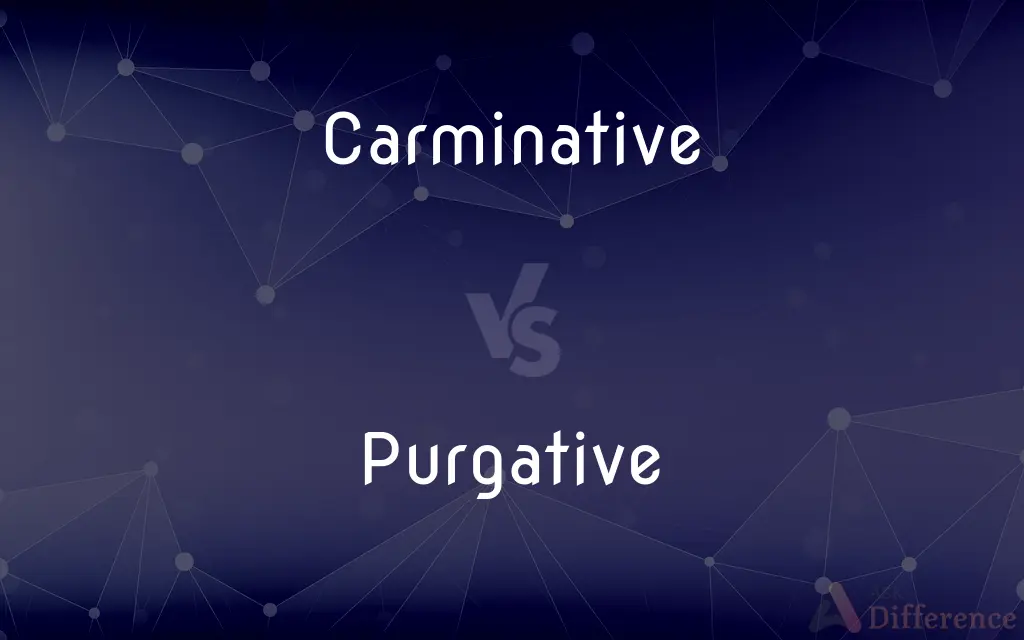Carminative vs. Purgative — What's the Difference?
Edited by Tayyaba Rehman — By Fiza Rafique — Updated on April 1, 2024
Carminatives are herbs or substances that relieve gas and bloating in the digestive system, whereas purgatives are agents that stimulate bowel movements to relieve constipation.

Difference Between Carminative and Purgative
Table of Contents
ADVERTISEMENT
Key Differences
Carminatives work by relaxing the muscles of the digestive tract and reducing the formation of gas bubbles, which can alleviate discomfort and bloating. On the other hand, purgatives act by stimulating the muscles of the intestines, increasing water in the stool, or both, to facilitate easier bowel movements and cleanse the colon.
Carminative substances often have a mild effect and are used to ease gastrointestinal symptoms without causing a strong reaction. Whereas purgatives can have a more intense action, leading to significant increase in bowel movement, and are used in cases of severe constipation or for medical preparations.
Many carminatives are natural herbal remedies such as peppermint, fennel, and ginger, known for their gentle soothing properties. Purgatives, however, can range from mild natural laxatives like senna to stronger pharmaceutical preparations like bisacodyl.
While carminatives are commonly used for immediate relief of gas and bloating and can be incorporated into daily routines, purgatives are often used for short-term relief of constipation or to prepare for procedures like colonoscopies.
Carminatives and purgatives both address digestive issues, but their approaches and applications differ significantly. Carminatives focus on symptom relief through soothing mechanisms, whereas purgatives aim at cleansing and bowel movement stimulation.
ADVERTISEMENT
Comparison Chart
Primary function
Relieve gas and bloating
Stimulate bowel movements
Action mechanism
Relax digestive tract muscles and reduce gas
Increase bowel movement and stool water content
Usage frequency
Can be used regularly for symptom management
Typically used short-term or as needed
Examples
Peppermint, fennel, ginger
Senna, bisacodyl, magnesium sulfate
Effect intensity
Generally mild
Can range from mild to strong
Compare with Definitions
Carminative
An agent that helps expel gas from the stomach and intestines.
Adding ginger to tea acts as a carminative, soothing the digestive tract.
Purgative
A substance that causes significant bowel movement.
Aloe vera juice acts as a mild purgative to relieve constipation.
Carminative
Herbal extracts with anti-flatulence properties.
Chamomile tea is used as a carminative to relieve digestive stress.
Purgative
Medicinal agents used to treat severe constipation.
Laxatives like bisacodyl are purgatives that help cleanse the bowel.
Carminative
Ingredients in culinary that prevent gas formation.
Culinary spices like cumin serve as carminatives in many dishes.
Purgative
Natural or synthetic compounds inducing defecation.
Castor oil is a strong purgative used in traditional medicine.
Carminative
Non-pharmacological remedies for gastrointestinal discomfort.
A warm cup of fennel tea can be a gentle carminative after a large meal.
Purgative
Remedies that increase stool water content for easier passage.
Senna leaves are purgatives that soften the stool.
Carminative
Substances used in herbal medicine to improve digestion.
Peppermint oil capsules are popular carminatives that reduce bloating.
Purgative
Agents used in preparation for medical procedures.
Magnesium sulfate is a purgative used before colonoscopies.
Carminative
A carminative, also known as carminativum (plural carminativa), is an herb or preparation intended to either prevent formation of gas in the gastrointestinal tract or facilitate the expulsion of said gas, thereby combatting flatulence.
Purgative
Tending to cleanse or purge, especially causing evacuation of the bowels.
Carminative
(chiefly of a drug) relieving flatulence.
Purgative
A purgative agent or medicine; a cathartic.
Carminative
A drug that relieves flatulence.
Purgative
(capable of) purging
Carminative
Inducing the expulsion of excess gas from the stomach and intestines.
Purgative
Something, such as a substance or medicine, that purges; laxative
Carminative
A carminative drug or agent.
Purgative
Having the power or quality of purging; cathartic.
Carminative
Relieving discomfort of gas in the digestive tract.
Purgative
A purging medicine; stimulates evacuation of the bowels
Carminative
(medicine) A drug or substance that induces the releasing of gas from the digestive tract.
Purgative
Strongly laxative
Carminative
Expelling wind from the body; warming; antispasmodic.
Carminative
A substance, esp. an aromatic, which tends to expel wind from the alimentary canal, or to relieve colic, griping, or flatulence.
Carminative
Medication that prevents the formation of gas in the alimentary tract or eases its passing
Carminative
Relieving gas in the alimentary tract (colic or flatulence or griping)
Common Curiosities
Can carminatives treat constipation?
While carminatives can ease digestive discomfort, they are not primarily used to treat constipation.
Are all purgatives strong laxatives?
No, purgatives range from mild natural remedies to strong pharmaceutical laxatives.
Can I use carminatives daily?
Yes, many carminatives can be safely incorporated into daily routines for digestive health.
What are carminatives used for?
Carminatives are used to relieve gas, bloating, and digestive discomfort.
How do purgatives work?
Purgatives work by stimulating bowel movements and increasing stool water content.
How quickly do carminatives work?
Carminatives usually work within a few hours to relieve gas and bloating.
What's the difference between a purgative and a laxative?
Purgatives are a subset of laxatives known for their stronger effects in inducing bowel movements.
Are there synthetic carminatives?
While most carminatives are natural, there are also synthetic options available that mimic the soothing effects on the digestive system.
Are purgatives safe for children?
Some mild purgatives may be safe for children at appropriate doses, but always consult a pediatrician first.
Is it safe to use purgatives regularly?
Regular use of strong purgatives is not recommended without medical advice due to potential side effects.
Do carminatives have side effects?
Carminatives are generally safe with minimal side effects, but some people may experience allergies or sensitivities.
Can purgatives be used for weight loss?
Using purgatives for weight loss is unsafe and not recommended as it can lead to serious health issues.
Can I take carminatives with other medications?
While generally safe, it's important to consult a healthcare provider before combining carminatives with other medications.
What are natural sources of purgatives?
Natural sources include senna, castor oil, and aloe vera.
How do I choose between a carminative and a purgative?
Choice depends on whether you're seeking to relieve gas and bloating (carminative) or stimulate bowel movements (purgative).
Share Your Discovery

Previous Comparison
Inquietude vs. Disquiet
Next Comparison
Crossroads vs. RoundaboutAuthor Spotlight
Written by
Fiza RafiqueFiza Rafique is a skilled content writer at AskDifference.com, where she meticulously refines and enhances written pieces. Drawing from her vast editorial expertise, Fiza ensures clarity, accuracy, and precision in every article. Passionate about language, she continually seeks to elevate the quality of content for readers worldwide.
Edited by
Tayyaba RehmanTayyaba Rehman is a distinguished writer, currently serving as a primary contributor to askdifference.com. As a researcher in semantics and etymology, Tayyaba's passion for the complexity of languages and their distinctions has found a perfect home on the platform. Tayyaba delves into the intricacies of language, distinguishing between commonly confused words and phrases, thereby providing clarity for readers worldwide.














































